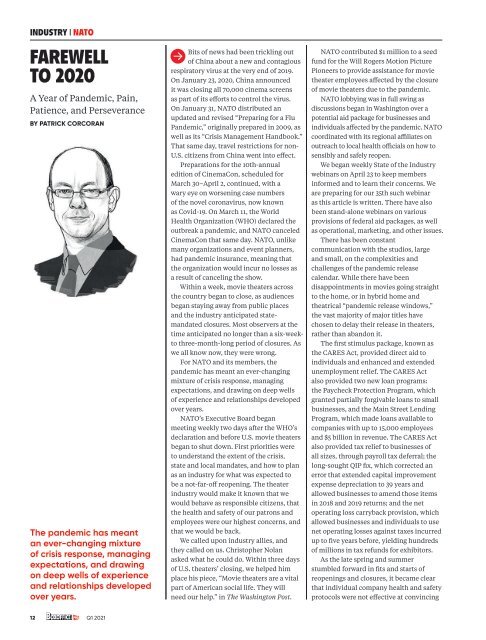Boxoffice Pro Q1 2021
Boxoffice Pro is the official publication of the National Association of Theatre Owners.
Boxoffice Pro is the official publication of the National Association of Theatre Owners.
Create successful ePaper yourself
Turn your PDF publications into a flip-book with our unique Google optimized e-Paper software.
Industry NATO<br />
FAREWELL<br />
TO 2020<br />
A Year of Pandemic, Pain,<br />
Patience, and Perseverance<br />
BY PATRICK CORCORAN<br />
The pandemic has meant<br />
an ever-changing mixture<br />
of crisis response, managing<br />
expectations, and drawing<br />
on deep wells of experience<br />
and relationships developed<br />
over years.<br />
Bits of news had been trickling out<br />
of China about a new and contagious<br />
respiratory virus at the very end of 2019.<br />
On January 23, 2020, China announced<br />
it was closing all 70,000 cinema screens<br />
as part of its efforts to control the virus.<br />
On January 31, NATO distributed an<br />
updated and revised “Preparing for a Flu<br />
Pandemic,” originally prepared in 2009, as<br />
well as its “Crisis Management Handbook.”<br />
That same day, travel restrictions for non-<br />
U.S. citizens from China went into effect.<br />
Preparations for the 10th-annual<br />
edition of CinemaCon, scheduled for<br />
March 30–April 2, continued, with a<br />
wary eye on worsening case numbers<br />
of the novel coronavirus, now known<br />
as Covid-19. On March 11, the World<br />
Health Organization (WHO) declared the<br />
outbreak a pandemic, and NATO canceled<br />
CinemaCon that same day. NATO, unlike<br />
many organizations and event planners,<br />
had pandemic insurance, meaning that<br />
the organization would incur no losses as<br />
a result of canceling the show.<br />
Within a week, movie theaters across<br />
the country began to close, as audiences<br />
began staying away from public places<br />
and the industry anticipated statemandated<br />
closures. Most observers at the<br />
time anticipated no longer than a six-weekto<br />
three-month-long period of closures. As<br />
we all know now, they were wrong.<br />
For NATO and its members, the<br />
pandemic has meant an ever-changing<br />
mixture of crisis response, managing<br />
expectations, and drawing on deep wells<br />
of experience and relationships developed<br />
over years.<br />
NATO’s Executive Board began<br />
meeting weekly two days after the WHO’s<br />
declaration and before U.S. movie theaters<br />
began to shut down. First priorities were<br />
to understand the extent of the crisis,<br />
state and local mandates, and how to plan<br />
as an industry for what was expected to<br />
be a not-far-off reopening. The theater<br />
industry would make it known that we<br />
would behave as responsible citizens, that<br />
the health and safety of our patrons and<br />
employees were our highest concerns, and<br />
that we would be back.<br />
We called upon industry allies, and<br />
they called on us. Christopher Nolan<br />
asked what he could do. Within three days<br />
of U.S. theaters’ closing, we helped him<br />
place his piece, “Movie theaters are a vital<br />
part of American social life. They will<br />
need our help.” in The Washington Post.<br />
NATO contributed $1 million to a seed<br />
fund for the Will Rogers Motion Picture<br />
Pioneers to provide assistance for movie<br />
theater employees affected by the closure<br />
of movie theaters due to the pandemic.<br />
NATO lobbying was in full swing as<br />
discussions began in Washington over a<br />
potential aid package for businesses and<br />
individuals affected by the pandemic. NATO<br />
coordinated with its regional affiliates on<br />
outreach to local health officials on how to<br />
sensibly and safely reopen.<br />
We began weekly State of the Industry<br />
webinars on April 23 to keep members<br />
informed and to learn their concerns. We<br />
are preparing for our 35th such webinar<br />
as this article is written. There have also<br />
been stand-alone webinars on various<br />
provisions of federal aid packages, as well<br />
as operational, marketing, and other issues.<br />
There has been constant<br />
communication with the studios, large<br />
and small, on the complexities and<br />
challenges of the pandemic release<br />
calendar. While there have been<br />
disappointments in movies going straight<br />
to the home, or in hybrid home and<br />
theatrical “pandemic release windows,”<br />
the vast majority of major titles have<br />
chosen to delay their release in theaters,<br />
rather than abandon it.<br />
The first stimulus package, known as<br />
the CARES Act, provided direct aid to<br />
individuals and enhanced and extended<br />
unemployment relief. The CARES Act<br />
also provided two new loan programs:<br />
the Paycheck <strong>Pro</strong>tection <strong>Pro</strong>gram, which<br />
granted partially forgivable loans to small<br />
businesses, and the Main Street Lending<br />
<strong>Pro</strong>gram, which made loans available to<br />
companies with up to 15,000 employees<br />
and $5 billion in revenue. The CARES Act<br />
also provided tax relief to businesses of<br />
all sizes, through payroll tax deferral; the<br />
long-sought QIP fix, which corrected an<br />
error that extended capital improvement<br />
expense depreciation to 39 years and<br />
allowed businesses to amend those items<br />
in 2018 and 2019 returns; and the net<br />
operating loss carryback provision, which<br />
allowed businesses and individuals to use<br />
net operating losses against taxes incurred<br />
up to five years before, yielding hundreds<br />
of millions in tax refunds for exhibitors.<br />
As the late spring and summer<br />
stumbled forward in fits and starts of<br />
reopenings and closures, it became clear<br />
that individual company health and safety<br />
protocols were not effective at convincing<br />
12 <strong>Q1</strong> <strong>2021</strong><br />
12-14_NATO.indd 12 15/02/<strong>2021</strong> 15:10

















